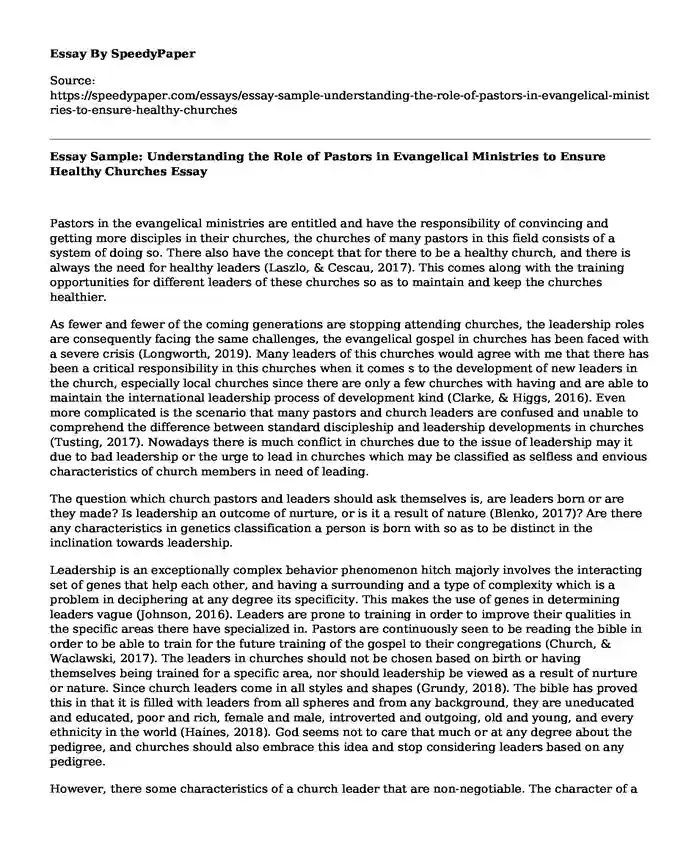Pastors in the evangelical ministries are entitled and have the responsibility of convincing and getting more disciples in their churches, the churches of many pastors in this field consists of a system of doing so. There also have the concept that for there to be a healthy church, and there is always the need for healthy leaders (Laszlo, & Cescau, 2017). This comes along with the training opportunities for different leaders of these churches so as to maintain and keep the churches healthier.
As fewer and fewer of the coming generations are stopping attending churches, the leadership roles are consequently facing the same challenges, the evangelical gospel in churches has been faced with a severe crisis (Longworth, 2019). Many leaders of this churches would agree with me that there has been a critical responsibility in this churches when it comes s to the development of new leaders in the church, especially local churches since there are only a few churches with having and are able to maintain the international leadership process of development kind (Clarke, & Higgs, 2016). Even more complicated is the scenario that many pastors and church leaders are confused and unable to comprehend the difference between standard discipleship and leadership developments in churches (Tusting, 2017). Nowadays there is much conflict in churches due to the issue of leadership may it due to bad leadership or the urge to lead in churches which may be classified as selfless and envious characteristics of church members in need of leading.
The question which church pastors and leaders should ask themselves is, are leaders born or are they made? Is leadership an outcome of nurture, or is it a result of nature (Blenko, 2017)? Are there any characteristics in genetics classification a person is born with so as to be distinct in the inclination towards leadership.
Leadership is an exceptionally complex behavior phenomenon hitch majorly involves the interacting set of genes that help each other, and having a surrounding and a type of complexity which is a problem in deciphering at any degree its specificity. This makes the use of genes in determining leaders vague (Johnson, 2016). Leaders are prone to training in order to improve their qualities in the specific areas there have specialized in. Pastors are continuously seen to be reading the bible in order to be able to train for the future training of the gospel to their congregations (Church, & Waclawski, 2017). The leaders in churches should not be chosen based on birth or having themselves being trained for a specific area, nor should leadership be viewed as a result of nurture or nature. Since church leaders come in all styles and shapes (Grundy, 2018). The bible has proved this in that it is filled with leaders from all spheres and from any background, they are uneducated and educated, poor and rich, female and male, introverted and outgoing, old and young, and every ethnicity in the world (Haines, 2018). God seems not to care that much or at any degree about the pedigree, and churches should also embrace this idea and stop considering leaders based on any pedigree.
However, there some characteristics of a church leader that are non-negotiable. The character of a leader, however, not born should be competent and seasoned, so as to influence the people of God in accomplishing the plans God in the world. The intersection of character is the leadership that is referred to as Godly one, and the person with it should be calling and competent also (Scherer, Alban, & Weisbord, 2016). Charisma has always been confused by many with leadership. It is the high time people should have a difference between the two.
References
Blenko, D. (2017). Appreciative Inquiry as a Resource for Positive Change in a Church Ministry (Doctoral dissertation, Pepperdine University).
Church, A. H., & Waclawski, J. (2017). Designing and using organizational surveys. Routledge.
Grundy, M. (2019). Ministry, the journal of the Edward King Institute for Ministry Development. Rural Theology, 1-10.
Clarke, N., & Higgs, M. (2016). How strategic focus relates to the delivery of leadership training and development. Human Resource Management, 55(4), 541-565.
Grundy, M. (2018). The Edward King Institute for Ministry Development: 1986 to 2003. Rural Theology, 16(2), 112-122.
Haines, A. L. (2018). Global Leadership: Exploring Leadership Capacities, Trends, Needs, and Development for Four Global Contexts Using Appreciative Inquiry and Asset-based Development Approach. Virginia Union University.
Johnson, S. M. (2016). Running with patience: Encouraging the long-term pastorate. Review & Expositor, 113(3), 359-368.
Laszlo, C., & Cescau, P. (2017). Sustainable value: How the world's leading companies are doing well by doing good. Routledge.
Longworth, N. (2019). Making lifelong learning work. Routledge.
Scherer, J. J., Alban, B., & Weisbord, M. (2016). The Origins of Organization Development. Practicing Organization Development.
Tusting, K. (2017). The Rise of Congregational Studies in the USA Arthur Farnsley. In Congregational Studies in the UK (pp. 45-58). Routledge.
Cite this page
Essay Sample: Understanding the Role of Pastors in Evangelical Ministries to Ensure Healthy Churches. (2023, Feb 25). Retrieved from https://speedypaper.com/essays/essay-sample-understanding-the-role-of-pastors-in-evangelical-ministries-to-ensure-healthy-churches
Request Removal
If you are the original author of this essay and no longer wish to have it published on the SpeedyPaper website, please click below to request its removal:
- Effects of Exports Amount on the GDP of African Countries
- Free Essay on the Invasion of the Lionfish in America's Paradise
- Dealing with Darwin - Book Review Essay Sample
- The Greatest Challenge in My Life - Personal Experience Essay Example
- Essay Sample: Educational Aim and Pressure on Curriculum: Human Flourishing/Happiness
- Psychology Essay Sample: The Environmental Effects of Crime in the African American community
- Free Essay on Putting Ethnographic Writing in Context
Popular categories





